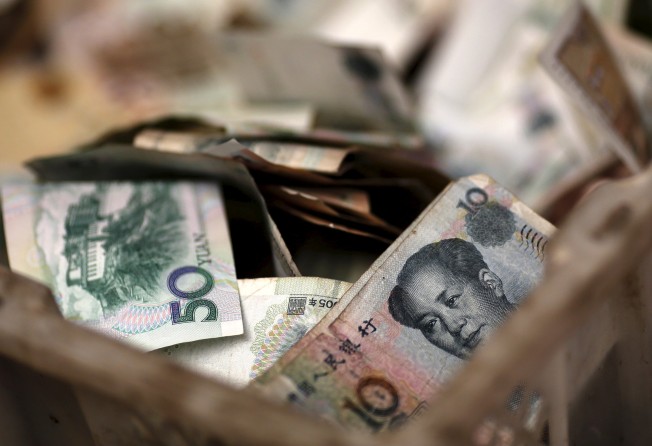Beijing has good reasons to keep yuan firm in face of downward pressure

Where would the yuan be against the US dollar if central authorities stepped back? A lot weaker suggest several recent reports.
Whether that would be a good thing is another matter.
That the yuan is being artificially supported by Beijing is not in dispute. The mainland government has so far eschewed the beggar thy neighbour currency devaluation strategies adopted by Asian and European nations desperately seeking export competitiveness.
Instead, concerns about capital outflows were the yuan to soften, as well as more prosaic arguments about joining a global currency club, are all in the central government’s mind right now.
Currently trading around 6.2 to the US dollar – close to its strongest since the end of the fixed rate system in 2006 – the yuan should be north of 6.5, given China’s slowing economy, recent rate cuts, and a difficult export market, says Micheal Every, Rabobank financial markets head.
The yuan rose 4 per cent this year on a trade weighted basis, wrote Every in a report issued this week. The currency is now trading almost static against the US dollar.In China’s onshore forex market a mid price is announced against the US dollar every morning by the People’s Bank of China. The yuan can rise or fall by up to 2 per cent against the mid price each trading day. In recent trading sessions the mid price was set above market close, suggesting the PBOC is battling against pro-weakening sentiment.
Identifying Beijing’s “policy bias for currency stability”, HSBC analysts this week revised year-end US dollar-yuan forecasts to 6.26 and 6.32 for 2015 and 2016 respectively, from 6.34 and 6.44.
A recent report penned by HSBC strategists David Bloom and Paul Mackel argued in favour of China’s currency policy.
“By ruling out short-term currency devaluation, policymakers and the private sector are more incentivised to pursue economic and financial reforms to resolve the structural problems of low growth and high debt,” the report said.
This was a line similar to Chinese premier Li Keqiang who argued in a recent Financial Times interview that a devalued currency would weaken domestic demand, and competitive devaluation could start a “currency war”.
Analyst Every believes the currency should weaken to reflect the country’s slowing economy, though he understands why the government is loathe to let this happen as yuan holders would rush to the exits. China’s currency reserves already fell from US$ 3.93 trillion in June 2014 to US$ 3.73 billion as of end-March, a gross outflow of US$718 billon once trade surpluses are factored in, wrote Every.
“This is worrying enough, but the PBOC [is] concerned about the risks of even more capital exiting if it allows CNY to depreciate significantly: what has been a stream until now might become a flood,” Every wrote.A weaker yuan would also impact an estimated US$1.1 trillion in mostly unhedged foreign debts held by Chinese corporates, says Every, citing Bank for International Settlements data. This would increase loan servicing costs and possibly result in defaults and bankruptcies.
Finally, Beijing is angling for the yuan to join the International Monetary Fund Special Drawing Rights basket later this year. It is a major step towards becoming a global reserve currency, and so a stable yuan-US dollar exchange rate ahead of the meeting, is seen as a big plus.
So instead of weakening the currency the central bank uses other tools to aid growth, like April’s bank reserve rate cut, which freed an estimated 1.2-1.5 trillion yuan for lending.
In the fight between traders and the PBOC there is no contest. The market may want the yuan to weaken but for now nobody can beat Beijing.